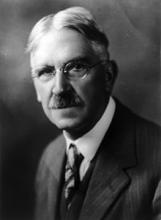Born on 20 October 1859, in Burlington, Vermont, John Dewey attended the University of Vermont in Burlington. He was greatly impressed by G. H. Perkins and the writings of T. H. Huxley regarding evolutionary theory, which profoundly shaped Dewey’s thought. He came to apply the rejection of a static model of nature to his growing interest in psychology and theories of knowledge, while his relationship with his professor H. A. P. Torrey fuelled his interests in philosophy. After graduating in 1879, he spent three years as a high school teacher, but his passion for philosophy persisted. He submitted an article to the editor of the Journal of Speculative Philosophy, W. T. Harris, which was duly accepted. Bolstered in his resolve to study philosophy, Dewey entered Johns Hopkins University as a graduate student in 1884, where he studied under the Hegelian philosopher George Sylvester Morris and the experimental psychologist G. Stanley Hall.
After completing his doctorate in 1884, Dewey taught at the University of Michigan until 1894, with a one-year hiatus to the University of Minnesota (1888-89). During this decade Dewey produced two books which solidified his duel interests in philosophy and psychology, as well as his burgeoning desire for learning theory: Psychology (1887) and Leibniz’s New Essays Concerning the Human Understanding (1888). In 1894, Dewey left Michigan for the University of Chicago, where he founded a laboratory where he developed his ideas of pedagogical method. In this applied environment Dewey’s idealism was gradually shaped by his empirical research and with the growing pragmatist school of thought which came to characterise his work. Along with Charles Sanders Peirce and fellow Gifford Lecturer William James, Dewey is widely regarded as one of the three most prominent figures in the American Pragmatism movement, although he referred to his own philosophy as ‘instrumentalism’. After a decade in Chicago, he resigned following problems surrounding his laboratory and relocated to the philosophy department of Columbia University in 1904, where he would spend the remainder of his career. At Columbia he continued to pursue his research and published on the topics of metaphysics and theory of knowledge as well as on his persisting interest, educational theory. This was encouraged by his involvement with the education of teachers at Columbia and, in 1919, along with the historian Charles Beard and economists Thorstein Veblen and James Harvey Robinson, he founded the New School for Social Research in Greenwich Village.
In addition to teaching, publishing, writing frequent contributions for magazines like The New Republic and Nation, involvement in contemporary political and social issues like suffrage and the unionisation of teachers, Dewey was widely sought after to give public lectures. In 1928-29 he delivered the Gifford Lectures under the title The Quest for Certainty. The following year he retired from Columbia University, but continued to work steadily until his death. In the mid-1930s he participated in the Commission of Inquiry into the Leon Trotsky trial in Moscow and vigorously defended the philosopher Bertrand Russell when conservatives attempted to remove him from his chair at the College of the City of New York. His international reputation led to his twice being enlisted as a consultant to the University of Beijing and to a commissioned report on the reorganization of Turkish schools.
Dewey died at the age of ninety-two on 2 June 1952.
Publications
Psychology (1887); The School and Society (1899; rev. ed. 1915); Ethics (with James H. Tufts, 1908); The Influence of Darwin on Philosophy and Other Essays in Contemporary Thought (1910); How We Think (1910, rev. ed. 1933); Democracy and Education (1916); Essays in Experimental Logic (1916); Reconstruction in Philosophy (1920); Human Nature and Conduct (1922); Experience and Nature (1925); The Public and Its Problems (1927); The Quest for Certainty (1929); Philosophy and Civilization (1932); A Common Faith (1934); Art as Experience (1934); Liberalism and Social Action (1935); Experience and Education (1938); Logic: The Theory of Inquiry (1938); Freedom and Culture (1939); Theory of Valuation (1939); Problems of Men (1946); and Knowing and the Known (with Arthur F. Bentley, 1949).
For a complete collection of his writings, see The Early Works: 1892-1898 (5 vols), The Middle Works: 1899-1924 (15 vols), The Later Works: 1925-1953 (17 vols), all published by Southern Illinois University Press.
There has been a flurry of works on Dewey in the last decade: Raymond Boisvert, John Dewey: Rethinking Our Time (1997); Michael Eldridge, Transforming Experience: John Dewey’s Cultural Instrumentalism (1998); Larry A. Hickman and Thomas M. Alexander, eds., The Essential Dewey (1998); Jay Martin, The Education of John Dewey (2003); Charlene Haddock Seigfried, Feminist Interpretations of John Dewey (2001); John Shook, Dewey's Empirical Theory of Knowledge and Reality (2000); R. W. Sleeper and Tom Burke, The Necessity of Pragmatism: John Dewey’s Conception of Philosophy (2001).



